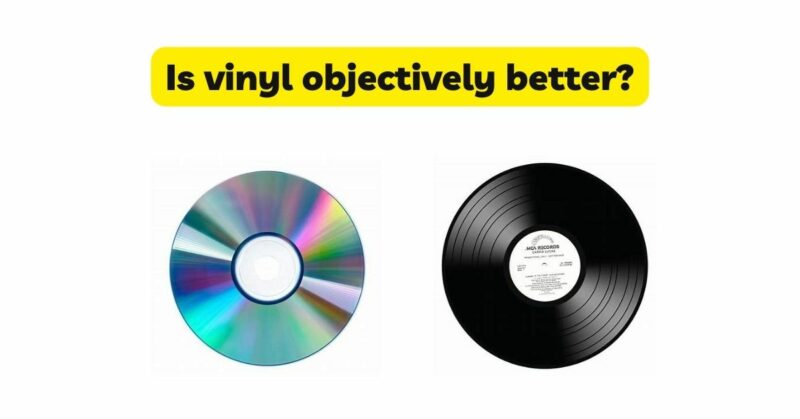The ongoing debate surrounding the superiority of vinyl records has captivated audiophiles and music enthusiasts alike. While many argue passionately for vinyl’s unique charm and sound quality, it is essential to assess the objective merits of the format. In this article, we will delve into the objective aspects of vinyl records, including their technical specifications, inherent limitations, and comparisons to other audio formats. By examining these factors, we aim to shed light on the question: Is vinyl objectively better?
- Technical Specifications: Vinyl records have specific technical specifications that set them apart from other formats. They operate at an analog level, capturing sound waves as physical grooves on the record surface. This analog nature allows for a continuous representation of the audio signal, resulting in a different sonic character compared to digital formats. While this analog characteristic may appeal to some listeners, it does not necessarily imply that vinyl is objectively better than other formats.
- Dynamic Range and Frequency Response: Dynamic range refers to the difference between the softest and loudest sounds in a recording, while frequency response describes the range of audio frequencies a format can reproduce. Vinyl records have the potential for a wide dynamic range and a unique frequency response curve. However, digital formats such as CDs or high-resolution audio can also achieve impressive dynamic range and extended frequency response. Thus, the objective superiority of vinyl in these aspects is subjective and depends on personal preferences.
- Distortion and Noise: Vinyl records introduce certain inherent distortions and surface noise. The physical nature of the medium can result in imperfections such as clicks, pops, and hisses. While some listeners find these artifacts charming or nostalgic, they are technically considered distortions that alter the original recording. In contrast, digital formats offer a cleaner, more transparent sound reproduction, free from these inherent artifacts. The absence of distortions and noise in digital formats can be considered an objective advantage over vinyl.
- Durability and Preservation: Vinyl records require careful handling, cleaning, and storage to maintain their optimal condition and sound quality. They are susceptible to wear, warping, and scratching, which can affect playback and degrade audio fidelity over time. In contrast, digital formats like CDs or lossless digital files are more durable and resistant to physical damage. They can be easily copied, stored, and played back without any loss of quality. From an objective standpoint, digital formats have an advantage in terms of long-term durability and preservation.
- Consistency and Reproducibility: One of the strengths of digital formats is their consistency and reproducibility. Once a digital audio file is created, it can be reproduced identically an unlimited number of times without any degradation in quality. Vinyl, on the other hand, can exhibit variations in sound quality due to factors like pressing quality, vinyl composition, and playback setup. Digital formats offer greater reliability and consistency, ensuring that the same audio quality is reproduced every time.
- Accessibility and Convenience: Digital formats have revolutionized the accessibility and convenience of music consumption. With the advent of streaming services and digital downloads, listeners can access an extensive library of music at their fingertips. Digital formats allow for instant playback and easy portability on various devices. Vinyl, while offering a tactile and ritualistic experience, requires physical handling, setup, and maintenance. From an objective standpoint, digital formats provide greater accessibility and convenience.
- Listener Preferences and Subjectivity: It is crucial to recognize that listener preferences and subjective experiences play a significant role in determining whether vinyl is objectively better. Sound perception is subjective, and individual preferences, emotional connections, and contextual factors all contribute to the perceived superiority of vinyl records. Some listeners find the analog nature, tactile experience, and inherent imperfections of vinyl appealing, whereas others prefer the clean, precise sound reproduction of digital formats. Objective analysis cannot fully capture these subjective aspects of music appreciation.
Conclusion: Determining whether vinyl is objectively better than other formats requires a careful consideration of technical specifications, inherent limitations, and comparisons to other formats. While vinyl records possess unique characteristics, such as analog sound reproduction and a distinctive sonic signature, they also come with inherent limitations, including distortions and susceptibility to physical damage. Digital formats offer advantages in terms of consistency, durability, accessibility, and convenience. Ultimately, the question of vinyl’s objective superiority is subjective and dependent on individual preferences and the desired listening experience. The choice between vinyl and other formats should be driven by personal taste, emotional connection, and the appreciation of the unique qualities each format brings to the table.


